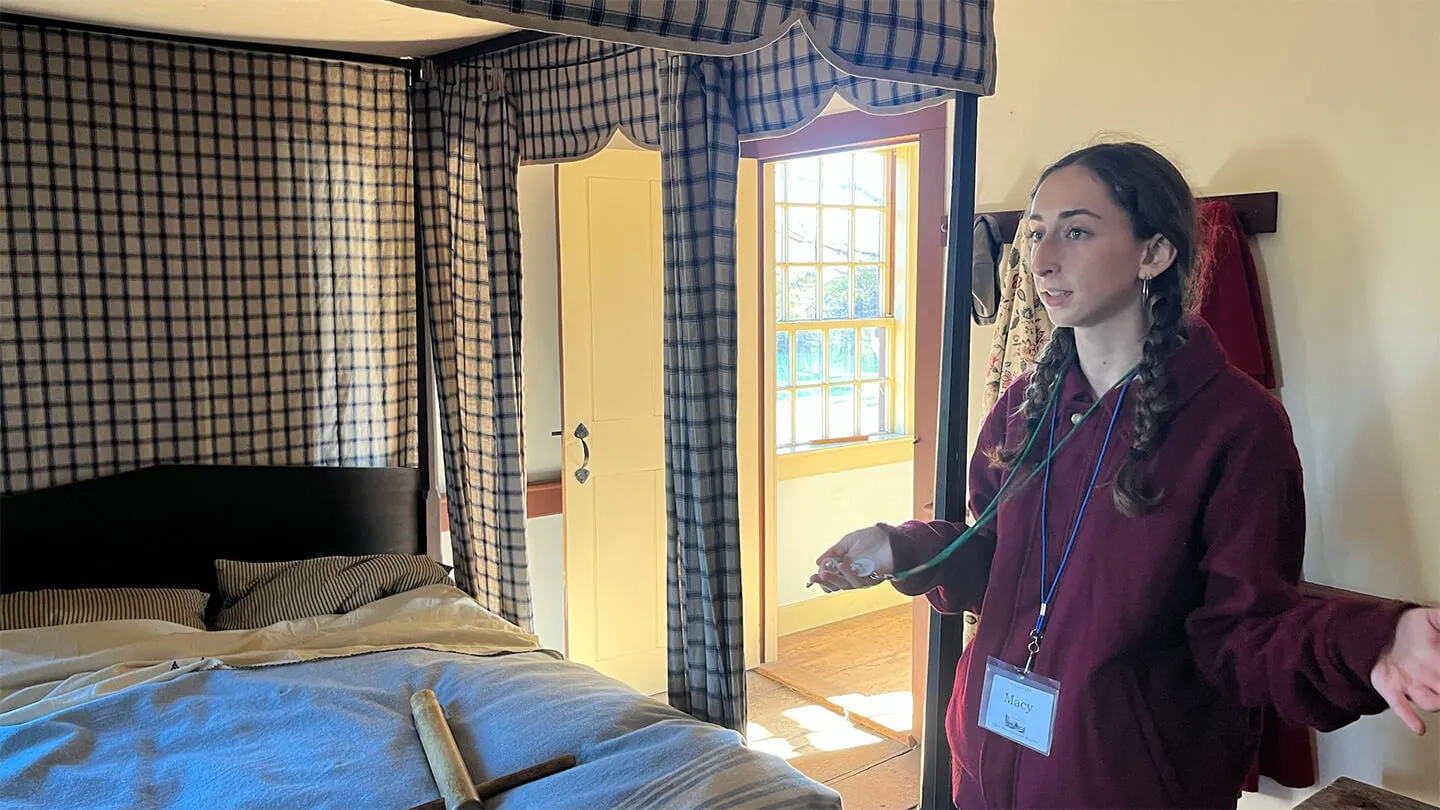An internship is a powerful way to not only enrich your college experience but to also help prepare you for life after graduation. That’s because a good internship isn’t just a job. It’s also a chance to meet people and make deep connections, learn valuable new skills, explore an area that intrigues you, and, in essence, try a career on for size. One of the best parts is, even if you decide the field isn’t quite right for you, you still come away with some serious insights about yourself, your strengths, and what makes you feel happy and fulfilled.
We asked five College of Arts and Sciences students to talk to us about their fall 2025 internships and how those experiences are helping shape what they envision for the future. Here’s what they had to say.
Name: Macy Isenberg (shown at top)
Year: Senior
Hometown: West Hartford, CT
Major/minor: History major, Reporting and Documentary Storytelling minor
Internship: Interpretation intern at Ethan Allen Homestead Museum historical site
What she does: Gives tours of the museum and works on creating a strategic plan for improving the garden as an interpretive spot for the museum
Why she chose it: “I knew a lot of history majors did internships with the museum, so I reached out this summer, and they said they needed garden help. It was awesome to get outside and work with my hands. Then they asked me to be an intern for the fall. It’s been super great to work with everyone”
Why she enjoys it: “I really like getting like to know all the volunteers there. Most are volunteering their time because they have an interest in history. A lot of them are retired and have all these interesting career trajectories, and that's been really fun to hear about. It’s just been so cool to work with people who want to give back to the community in a way that they find interesting.”
What she’s learned: “I had been avoiding public speaking throughout college, but when I started doing the tours I had to confront that fear and deal with it. I speak without a script to big groups of up to 20 people, and it was kind of scary at first. But now I feel a lot more comfortable with it, which I think will be super valuable no matter what I do after college. I’ve also learned a lot about how things actually get done at a non-profit by watching the managers and directors navigate different problems and plan events.”
What it means for the future: “I don't necessarily see myself working at a museum, but I feel it’s helped a lot with professional confidence. For example, I now write emails in a different, more professional tone. This experience has also taught me how to present myself in a professional setting and to collaborate with other people. So, while I might not do anything similar in the future, this experience has given me a lot of skills and confidence to tackle the kind of problems I might run into in other careers.”
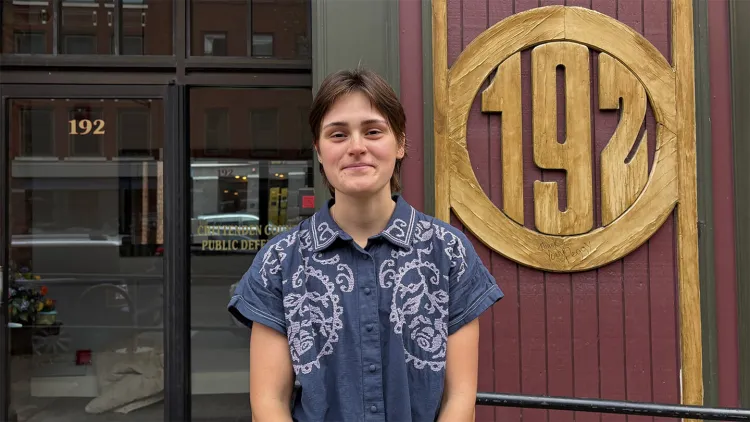
Name: Busy Anderson (shown above)
Year: Senior
Hometown: New York, NY
Major/minor: Political Science major; Gender and Women’s Studies, Reporting and Documentary Storytelling, and Health and Society triple-minor
Internship: Investigator intern in the Chittenden County Public Defender’s Office
What she does: Helps staff attorneys manage their misdemeanor cases, including assessing affidavits and police reports, summarizing evidence for the attorneys, and setting up appointments with clients
Why she chose it: “Understanding what workload and pace a legal office deals with, and having the opportunity to be in the same space as attorneys who have practiced for decades, really felt like it could fill in some blanks I had about what it means to go to law school, pass the bar, choose an office to work in, and stay in that field for a long time.”
Why she enjoys it: “There are a lot of moving parts when you're opening a case and trying to make sense of what was going on in someone's life at the time. It’s really challenging, but when you reach that moment where it comes together and you feel like you have a good idea of the big picture, it's super rewarding."
What she’s learned: “I’ve realized that you never have any idea what's going on in a person's life. All the assumptions that I come into a conversation with just go completely out the window within five minutes of talking to that person face to face, and that's been a harsh wakeup call in a lot of ways. I've definitely had moments when we were dealing with snapshots of people's lives that were hard to come to terms with. But you can't begin the conversation assuming you know anything about them or anything that contributed to the decisions they made. You never know what a person is going through, and because of that, you can't pass judgment on the decisions they make.”
What it means for the future: “I am thinking a lot more critically about law school and what my life would look like if I were to make that commitment. The attorneys in our office have been really transparent with me about times when having a career in law has been difficult, and maybe they've even been unsure that it was right for them. But they're still at our office and practicing every day, so, clearly, they have found it fulfilling and worthwhile. These are all considerations I'm having in a thoughtful way.”
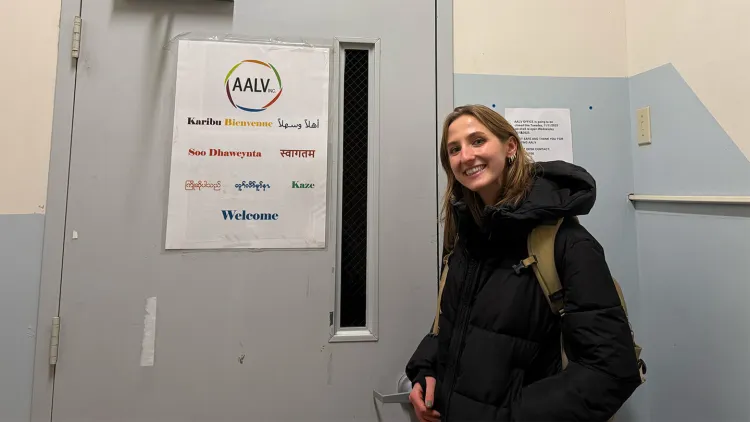
Name: Muriel Celia (shown above)
Year: Senior
Hometown: Collingswood, NJ
Major/minor: Sociology and Psychology double-major, Global Studies minor
Internship: Research assistant and data management intern for the Associations of Africans Living in Vermont (AALV)
What she does: Handles data management and organization, assists with program assessment for Trauma Systems Therapy for Refugees, conducts research
Why she chose it: “I had personal ambitions to continue working within local resettlement communities (particularly with youth) after having served with AmeriCorps as a summer enrichment coordinator in 2024. This internship, with its many and varied roles, also matches the intersections of my majors in sociology and psychology in a most satisfying way. I have been able to engage with the local community firsthand, explore the social work and non-profit sectors, and challenge myself both professionally and academically as a researcher.”
Why she enjoys it: “I love that the work feels meaningful and tangible. Having the opportunity to meet new members of my local community and learn from a variety of perspectives has been so much fun. This work excites me, and I have been so inspired by the passion, empathy, and diverse knowledge that surrounds me!”
What she’s learned: “Beyond deriving external inspiration from all the impressive people I’ve been lucky to work alongside, I have become more self-confident and assured. Pursuing research always intimidated me and felt like a realm exclusively for my STEM peers. Being entrusted with this work and given the space to make the internship my own has taught me to trust my own capabilities and capacity.”
What it means for the future: “I am interested in continuing to work with youth, in education with a focus on at-risk youth, and/or within the special education sector. I would like to continue exploring how clinical and community-based interventions can improve children’s outcomes and aid in rearing a capable and confident generation of young people. I am a firm believer that investing in our youth is the most grassroots solution to creating a more equitable society, and I intend to be an agent of this change. Furthermore, I am an avid proponent of community-based solutions as a highly effective and critical route to enacting widespread change. I know that I want my future work to be oriented around these engaged, community solutions. I think it’s the most sustainable way to go about inspiring change.”
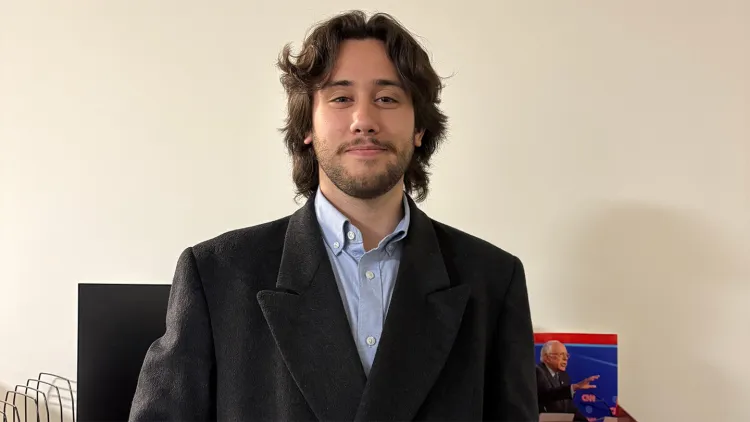
Name: Finn Walther (shown above)
Year: Senior
Hometown: White River Junction, VT
Major/minor: Political Science major, German minor
Internship: State Office intern in the Office of Senator Bernie Sanders
What he does: Writes referrals for and provides other help to constituents who contact the office, answers phones, logs mail, helps with community events
Why he chose it: “Naturally, as a political science major, I hope to one day work in the realm of politics, and this internship seemed like an incredible opportunity to get some first-hand experience. I also have a desire to help people. I've lived here my whole life, and I see how rough life has been getting for my fellow Vermonters in recent years. This internship lets me help create real change for people, even if it's on a smaller scale.”
Why he enjoys it: “I definitely enjoy helping constituents, but a close second would be the community at the office. The people there are a wonderful bunch and they're great to work with. While working at this internship, I've often encountered heavy, complex topics and situations, especially with everything that's been going on recently. But the community there is so supportive of each other. The hope and positivity they exude in spite of everything is inspiring.”
What he’s learned: “The most valuable thing I've learned is the inner processes of a constituent-focused office. Hearing about the biggest problems Vermonters are facing, both from the experts in the office and from Vermonters directly, has been an invaluable experience. In addition to that, this internship has really improved my personal self-confidence. When I applied this past summer, it was mostly just a shot in the dark, and for a long time after learning that I had been chosen for the internship, I felt there must have been some mistake. But over time I've come to learn that you shouldn’t underestimate yourself—you’ll never get where you want to be if you do. You just have to get out there, apply yourself, and find out your limits through experience instead of your own expectations.”
What it means for the future: “I’d like to work in the realm of politics, preferably to improve the lives of the common person through policy. This internship seems like a great first step in that direction. And even if, for some reason, I change my mind on what direction I'd like my life to go, I'm sure I'll always look back on my time in the office fondly. This really feels like a once-in-a-lifetime opportunity.”
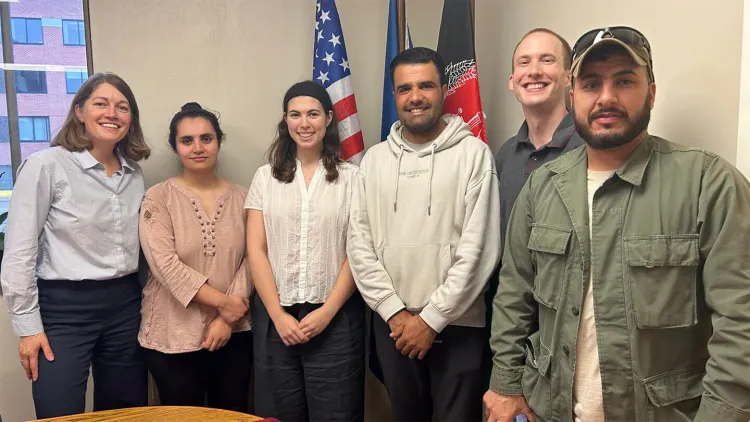
Name: Alia Liebowitz (shown above, 3rd from left)
Year: Junior
Hometown: Chappaqua, NY
Majors/minor: Geography, Global Studies, and Japanese triple-major, geospatial technology minor
Internship: Communication intern at the Vermont Afghan Alliance (VAA)
What she does: Manages social media and the organization’s website, writes the monthly newsletter, writes press releases, helps with other office needs
How she found it: “I do research with Professor Pablo Bose on refugee resettlement in southern Vermont, and he connected me with the VAA.”
Why she enjoys it: “Honestly, I just love meeting the people. Most of my co-workers are refugees from Afghanistan and they're from different regions, so they cover different parts of the country for new arrivals. I like hearing their stories. They're really strong, so I'm always moved by them.”
What she’s learned: “I’m learning how to navigate cross-cultural conversations and relationships. Sometimes clients will come in, and they don’t speak any English, and I need to offer them some tea while they wait. So, I’ve been learning how to communicate in those situations, learning different norms and about respecting a multicultural workplace. It’s something I have not experienced before. Even with my coworkers, I can really see the Afghan culture come out sometimes in what we're doing. For example, they will never take no for an answer when they're trying to give you food! I’ve learned to just say yes, thank you.”
What it means for the future: “I'm really passionate about working with people from different cultures and developing the kind of mindset and approach that comes from that. So, even if I don’t end up directly working in a refugee community, just knowing how to navigate these situations and having communication skills—both literal communication skills and job-related communication skills—will be extremely helpful. They are transferable to literally every single job. So, no matter what path I take, it's really setting me up for a successful career.”
